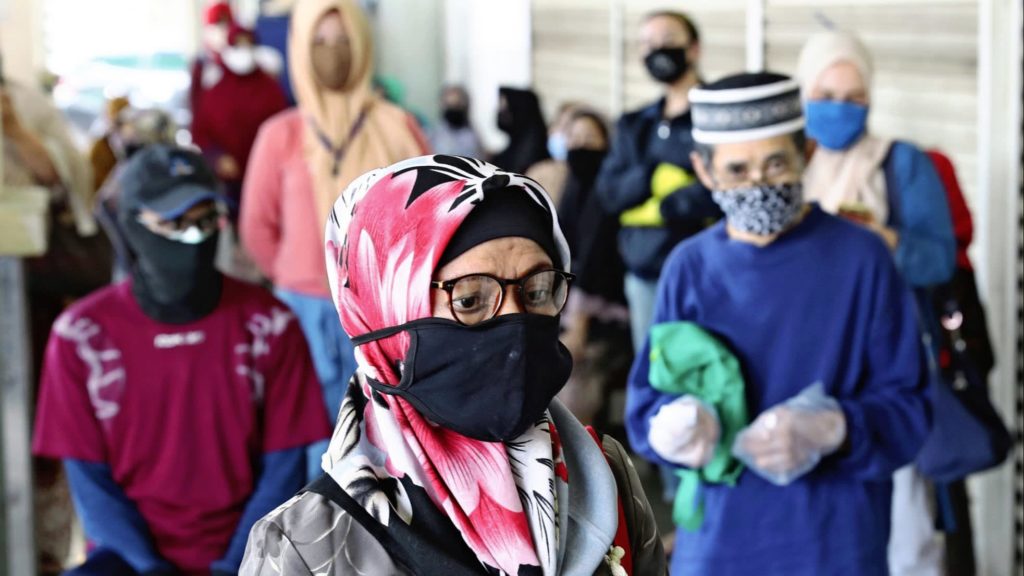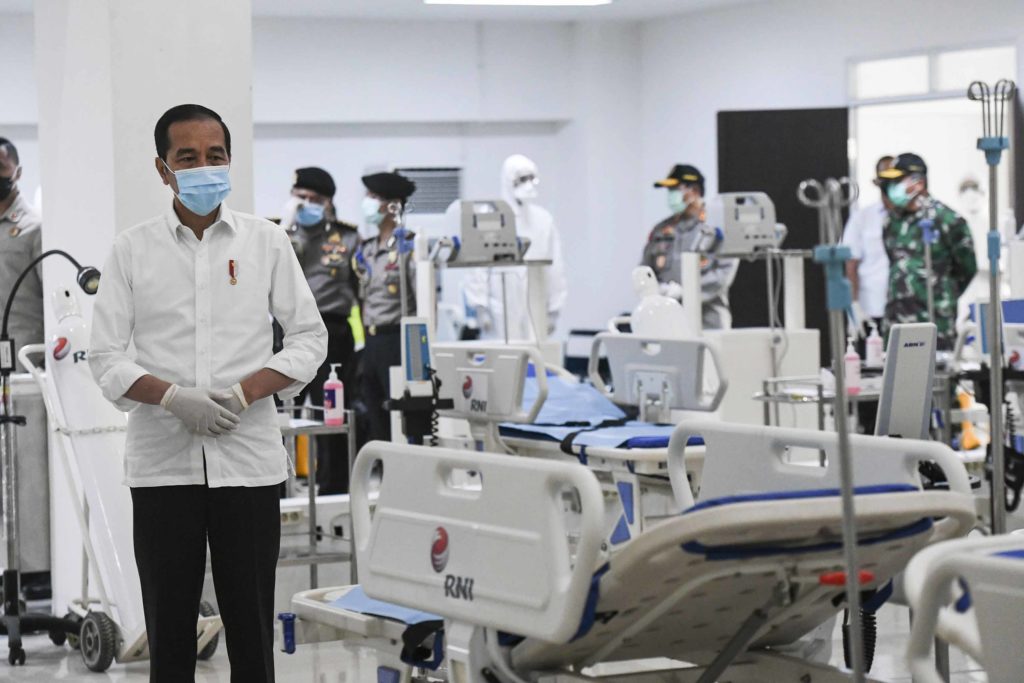Australia/Israel Review
COVID-19 and the Fate of Indonesian Democracy
May 1, 2020 | Zachary Abuza

At the time of writing, Indonesia had 7,775 confirmed cases of COVID-19, the second-highest in Southeast Asia. The rate of infection was doubling every 13 days.
But commentators really do not have a handle on the scope of the problem, as Indonesia has the lowest rate of testing in the region. As of April 23, Indonesia had conducted fewer than 50,000 tests, or 0.17 tests per 1,000 people. Even the Philippines had conducted three times that amount.
Six hundred and forty-seven deaths from COVID-19 have been reported (51% of the total reported COVID-19 deaths in Southeast Asia). But anecdotal reports suggest that this is a gross undercounting, with funerals in some provinces 40% higher than normal times. The Indonesian Doctors’ Association estimates more than a thousand dead, with many untested but having had COVID-19 symptoms.
The case fatality rate in Indonesia is the highest in Southeast Asia, currently over 9%. By comparison, Malaysia, which until mid-April had a similar number of confirmed cases, had a case fatality rate of just 1.7%. In part that is a factor of the dearth of testing in Indonesia. But it also speaks to Indonesia’s chronic underinvestment in its public health.
Indonesia’s public health spending is 3.1% of government spending, well below the ASEAN average of 4%, far below its neighbours: Malaysia (3.8%), Thailand (3.7%), Philippines (4.4%), and Vietnam (5.7%). The figures for physicians per 1,000 population show the same thing: Indonesia has 0.38 doctors per 1,000 people; the ASEAN (Association of Southeast Asian Nations) average is 1.04. Indonesia pales in comparison with its neighbours: Malaysia (1.51), Thailand (0.81), Philippines (1.28), Vietnam (0.82). The Global Health Index makes clear that in terms of most of their six categories (detection, risk, norms, prevention, response, and health), Indonesia lags behind its peers.
And yet, Indonesia is no stranger to viral epidemics: It has weathered SARS, H1N1, avian influenza, swine flu and MERS. Yet it did not make significant investments in preparedness, monitoring, or its health care systems.
The deaths of over 42 doctors and nurses put additional strains on the health care system.
And lest we forget, Indonesia’s already under-resourced health care system was further hobbled by the 2009 Law on Health that prioritised a creeping Islamist agenda. Its priority was assuring that all Muslims have the right to a Muslim doctor.
At the current rate of growth, Indonesia is likely to see well over 100,000 deaths from COVID-19 by the end of 2020, the earliest we may see a vaccine come on-line. However, this estimate may change in the wake of the new restrictions announced on April 23.
President Widodo’s Response
While no government should be blamed for a pandemic, how they respond to it is fair game. And what we have seen from the Indonesian Government’s initial response, up to April 22, has been inept, poorly communicated, indecisive, lacking transparency, and based on short-term economic calculations, not science.
The pandemic erupted in the second term of President Joko Widodo (widely known by the nickname “Jokowi”). He knew the levers of government. Yet the response was bungled from the start. The Government was in complete denial, downplaying the crisis, apparently fearing negative economic repercussions.
While other governments began lockdowns, President Jokowi was courting tourists. The Government pushed back against social distancing, only imposing stricter measures in mid-April, already too late. The Government flip-flopped on whether to allow people to return to their provinces for the Eid al-Fitr holiday, following Ramadan, before announcing last-minute extensive travel bans on April 23. Rapid transmission beyond the capital, where health care is even more under-resourced, will prolong the pandemic and increase the death toll.
While President Jokowi has accepted more testing kits from South Korea, and pledged to step up the rate of testing, the baseline is so low that it really won’t stem the rate of transmissions soon.
The belated announcement at the start of Ramadan on April 23 of a ban on “sea, air, land and railway transportation” across all of Indonesia, lasting until June, may possibly have more of an effect.

Indonesia’s healthcare system compares poorly with most of its neighbours, with far fewer doctors per capita
Indonesia has a very rudimentary social safety net. While the Government allocated IDR 405 trillion (AUD$40 billion) for urgent injection into the health infrastructure, including purchases of personal protection equipment (PPE) from China, it also had to earmark some social welfare for up to 10 million households. It has pledged electricity and food subsidies.
Indonesia is already the largest food importer in Southeast Asia and maintaining low prices for food and staples is critical for the Government. While the Government claims that it has 3.5 million tons of rice stockpiled, its national logistics agency BULOG is riddled with corruption and inefficiency.
Moreover, Indonesia had already acknowledged needing to import one million tons of rice in 2020, up from 600,000 tons in 2019. And due to droughts in Thailand and Vietnam in 2019, largely caused by China’s damming of the Mekong, rice prices are 7% higher. And with the pandemic, Thailand, Vietnam and Cambodia (the second, third, and eighth-largest exporters, respectively) have all temporarily halted rice exports because of fears of hoarding and price spikes at home. Should the price of food staples go up dramatically, there is a high potential for unrest.
The pandemic’s economic implications will be enormous, larger than the 2007-08 Asian Economic Crisis, which resulted in 40 million Indonesians unemployed or underemployed, and saw a major economic contraction. Indonesia’s currency is already approaching the exchange rate at the height of the 1998 crisis, US$1 being equal to IDR 15,795. In Jakarta alone, 300,000 workers are already eligible for unemployment benefits.
Commodity exports will fall with economic contractions and declining manufacturing in the region.
Indonesia is also likely to take another hit: regional countries that rely on migrant workers are going to be very reluctant to take any as long as the pandemic rages in Indonesia. That will lead to a significant drop in remittances, impacting domestic consumption.
The Political and Security Implications
While President Jokowi is in his last term and not permitted to run again, he still has well over five years to serve. And yet his timid response, mixed messages, and lack of a vision for moving forward have damaged his legitimacy and public trust in his Administration. While not a lame duck, he will emerge weaker politically, and with diminished public confidence.
That has an important implication for civil-military relations. Since the start of his Administration in 2014, the Indonesian military has been pushing to reassert itself in public life and civil administration. Though this push, known as Bela Negara, meaning “Defending the Nation,” was largely the pet project of the former minister of defence, Ryamizard Ryacudu, the current incumbent, Prabowo Subianto, has similar interests. President Widodo has already toyed with the passage of an emergency decree (as we’ve seen in Thailand, the Philippines and Cambodia), and he’s looked to the military to backstop his fumbling response.
It has not helped that his Minister of Health, Terawan Putranto, is a lieutenant general in the army. Terawan has been anti-science and an indecisive leader during the pandemic. While a handful of defence industries are quickly trying to produce ventilators, giving the Indonesian National Armed Forces (known by their Indonesian acronym TNI) greater powers over civilian life and public policy is a setback for Indonesia’s fragile democracy.
In terms of domestic security, we have not seen how the pandemic will play out. Islamist parties and organisations quickly scapegoated ethnic Chinese for COVID-19’s spread, always their default stance.
Indonesian officials were very slow to shut down a mass gathering of the Tabligh Islamic evangelical movement in Sulawesi, for fear of angering Islamists, even though a similar Tabligh gathering a few weeks earlier outside of Kuala Lumpur had led to outbreaks of COVID-19 in Malaysia, Singapore, Brunei, and Thailand. While the Government ultimately banned the gathering, it was only after thousands of people had already converged.
President Jokowi has been reluctant to ban religious gatherings for fear of angering Islamists, defaulting to letting individual imams make their own decisions.
Jamaah Ansharut Daulah (JAD), Indonesia’s Islamic State affiliate, has been largely quiet on the issue. While there was a shootout between police and members of the pro-Islamic State Mujahideen Indonesia Timur, leading to the deaths of two militants, it’s not clear how planned out the initial attack was.
The older Jemaah Islamiyah (JI) Islamist group is actually in a much stronger position than the JAD to take advantage of the situation as it has a very well developed network of charities and social welfare organisations. JI has been given ample space to regroup, which it has done effectively while letting the JAD be the focus of Indonesia’s counter-terrorism efforts.
Dr. Zachary Abuza is a professor at the National War College, Washington, DC and an adjunct at Georgetown University’s Security Studies Program. The views expressed are his personal opinions and do not reflect the opinions of the National War College or the US Department of Defence.
Tags: Asia, Indonesia, coronavirus






